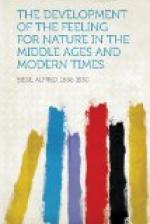Rosse answers him:
Ah,
good father,
Thou see’st the heavens, as troubled
with man’s act,
Threaten his bloody stage; by the clock
’tis day,
And yet dark night strangles the travelling
lamp.
Is’t night’s predominance
or the day’s shame
That darkness does the-face of earth entomb
When living light should kiss it?
The whole play is a thrilling expression of the sympathy for Nature which attributes its own feelings to her—a human shudder in presence of the wicked—a human horror of crime, most thrilling of all in Macbeth’s words:
Come,
seeling night,
Scarf up the tender eye of pitiful day,
And with thy bloody and invisible hand
Cancel and tear to pieces that great bond
Which keeps me pale.
In Hamlet, too, Nature is shocked at man’s mis-deeds:
... Such an act (the queen’s)
That blurs the grace and blush of modesty
... Heaven’s face doth glow,
Yea, this solidity and compound mass
With tristful visage, as against the doom,
Is thought-sick at the act.
But there are other personifications in this most wonderful of all tragedies, such as the magnificent one:
But look, the dawn, in russet mantle clad.
Walks o’er the dew of yon high eastern
hill.
The first player declaims:
But, as we often see, against some storm
A silence in the heavens, the rack stand
still,
The bold winds speechless, and the orb
below
As hush as death....
Ophelia dies:
When down her weedy trophies and herself
Fell in the weeping brook.
and Laertes commands:
Lay her i’ the earth,
And from her fair and unpolluted flesh
May violets spring.
Thus Shakespeare’s great imagination gave life and soul to every detail of Nature, and he obtained the right background for his dramas, not only through choice of scenery, but by making Nature a sharer of human impulse, happy with the happy, shuddering in the presence of wickedness.
He drew every phase of Nature with the individualizing touch which stamps her own peculiar character, and also brings her into sympathy with the inner life, often with that poetic intuition which is so closely allied to mythology. And this holds good not only in dealing with the great elementary forces—storms, thunder, lightning, etc.—but with flowers, streams, the glow of sunlight. Always and everywhere the grasp of Nature was intenser, more individual, and subjective, than any we have met hitherto.
Idyllic feeling for Nature became sympathetic in his hands.
CHAPTER VII
THE DISCOVERY OF THE BEAUTY OF LANDSCAPE
IN PAINTING




